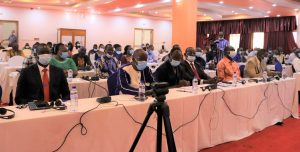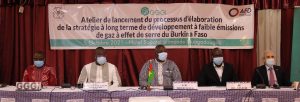Ouagadougou, October 05, 2021 – The Global Green Growth Institute (GGGI), in collaboration with the Government of Burkina Faso and the French Development Agency (AFD) launched the Low greenhouse gas emission development strategies. The hundreds of participants, very representatives of local actors, were chosen based on the synergy guiding spirit of the Low greenhouse gas emission development strategies project. They were representatives of the Presidency of Faso, the Prime Ministry, the National Assembly, the ministries in charge of energy, agriculture, animal resources, scientific research, finance, industry, housing, water and sanitation, and transport. The private sector, financial institutions, associations, and civil society organizations were also represented.
His Excellency Mr. Simeon SAWADOGO, Minister of Environment, chaired the ceremony and in his opening speech said: “the Government will ensure the proper conduct of the process, making use of all the qualified national expertise in the field and ensuring that all stakeholders from the public sector, the private sector and the community are effectively included in the constitution of sectoral task forces as well as in the composition of the technical monitoring committee”.
This workshop was an opportunity to share presentations on:
- the “2050 Facility” established and implemented by AFD to support the development of long-term low-carbon and climate-resilient development strategies and accompanying the governance of low-carbon and resilient planning through stakeholder’s dialogue and capacity-building actions;
- the introduction to the LT-LEDS: process, opportunities, and challenges;
- the LEDS project in Burkina Faso: context, objectives, activities, outputs, institutional structure.
The workshop allowed to:
- present the issues, challenges, and implementation mechanism of this project;
- inform about the establishment of structures that will be involved in the strategy formulation process, as well as the need to align the strategy with national development frameworks;
- build national commitment for the full success of the project process.
Burkina Faso’s climate profile indicates that it is particularly vulnerable to the threat of climate change, with floods, bush fires, extreme heat and drought being the main risks. In terms of greenhouse gas emissions, according to the provisional report of the Third National GHG Inventory (2019), in 2015, total greenhouse gas (GHG) emissions in Burkina Faso expressed in CO2 equivalent (Eq-CO2) were about 45,400 Gigagrams (Gg), an increase of 91% compared to 1995.
In 2015, the country adopted a National Climate Change Adaptation Plan (NAP) and has its first Nationally Determined Contribution (NDC) in November 2016 after ratifying the Paris Agreement. Due to the country’s high vulnerability to climate change, and in relation to its low responsibility in global emissions, its financial needs for adaptation and mitigation are estimated at several billion US dollars. The NDC proposes unconditional and conditional GHG emission reduction scenarios at the national level, broken down by sector, with greater reduction efforts in the Energy, Agriculture, Forestry and Other Land Use (AFOLU) sectors. A process of revision of this NDC is underway with a view to increasing its emission reduction ambitions for the period 2021-2025.
During the first One Planet Summit organized in Paris (December 2017), AFD committed to align its financial flows to the Paris Agreement by contributing to the establishment of low carbon and resilient trajectories. It has established the “2050 Facility” which aims at supporting the development of long-term low-carbon and climate-resilient development strategies and accompanying the governance of low-carbon and resilient planning through stakeholder’s dialogue and capacity-building actions. The establishment of this long-term strategy is financed through this facility.
The LT-LEDS development, which will be conducted under the umbrella of the Ministry of Environment, Green Economy, and climate Change aims to enhance the country’s ability to plan for decarbonization of its economy in the long-term, by providing a framework and a pathway for a progressive revision and enhancement of targets under its NDC to reduce CO2 emissions to 2030 and beyond.
Its adopted version will be presented to the United Nations Framework Convention on Climate Change (UNFCCC) in 2022. This is the country’s response to the Paris Agreement’s invitation to the Parties to strive to formulate and communicate such strategies, considering their common but differentiated responsibilities and respective capabilities, in the light of different national circumstances.
Synergy and national ownership are the two guiding principles of this project and the LT-LEDS process in Burkina Faso.

